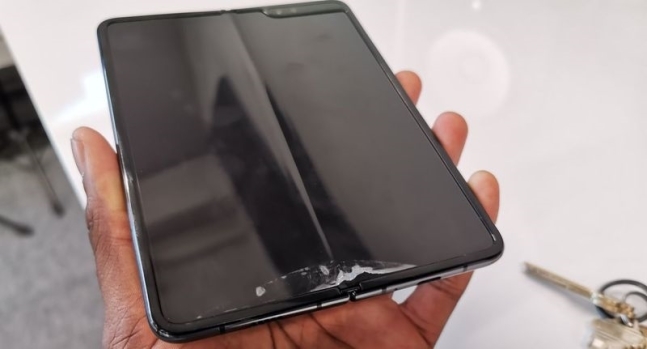 |
|
An image uploaded by a writer from The Verge showing cracks where screen folds in a tester model of Samsung’s Galaxy Fold. (provided by The Verge)
|
Electronics giant suffers loss of face amid stumble in first mover strategy
Samsung Electronics suffered a major blow in terms of market and consumer confidence with its Apr. 23 announcement of a delay in the launch of the Galaxy Fold, which it had originally planned to release in the US on Apr. 26. It marked the first time Samsung Electronics postponed the launch of a new product over technical issues. The unprecedented delay in the global launch of the first foldable phone – previously hyped as “opening a new chapter in the history of mobile innovation” – has raised questions about Samsung’s rashness in adopting a “first mover” strategy. On Apr. 23, Samsung Electronics announced a temporary delay in the launch of its Galaxy Fold in order to “improve the product’s completeness.” While the company initially denied the possibility of defects – downplaying international reports on Apr. 18 of screens fragmenting and going dead in tester models to “usage issues” – the company’s postponement of the launch three days later amounted to surrender. “Samsung Electronics created the new ‘Note’ category and was first to release a 5G smartphone. The foldable smartphone here was another example of a ‘first mover’ product,” a Samsung Electronic official said. “Innovation does not come without taking risks, and some problems may arise along the way. The postponement decision is meant to ensure greater satisfaction before the products reach consumers,” the official added. But the explanation from Samsung that day was generally interpreted as acknowledging consumer claims that the company had released the product on the market before it was fully perfected. Industry observers saw the situation as the result of Samsung Electronics focusing too much on its “first mover” strategy without sufficiently backing it up with technology. To commercialize the “world’s first” foldable phone, Samsung used colorless polyimide (CPI) in place of the reinforced glass used on other smartphones. In contrast, Apple has been girding for a longer battle by investing in the development of bendable glass to ensure durability, while display leader LG announced it was “still too early” to develop a foldable smartphone. “It looks like Samsung moved too hastily because it’s worried about aggressive late starters like Huawei,” said one industry source. Samsung is also facing complaints from consumers concerning communication problems and other issues with the Galaxy S10 following its domestic launch on Apr. 5 as the “world’s first” 5G smartphone. In its February unveiling of the Galaxy Fold, Samsung set a sales target of “at least 1 million units.” With Samsung shipping around 300 million smartphone units per year, the losses from the latest episode are not expected to be huge. But the loss of market confidence could prove very costly. Indeed, Samsung required some time to recover consumer trust after its painful experience in 2016 with the Galaxy Note 7, which was recalled twice and discontinued over battery fires. By Song Gyung-hwa and Shin Da-eun, staff reporters Please direct comments or questions to [english@hani.co.kr]






